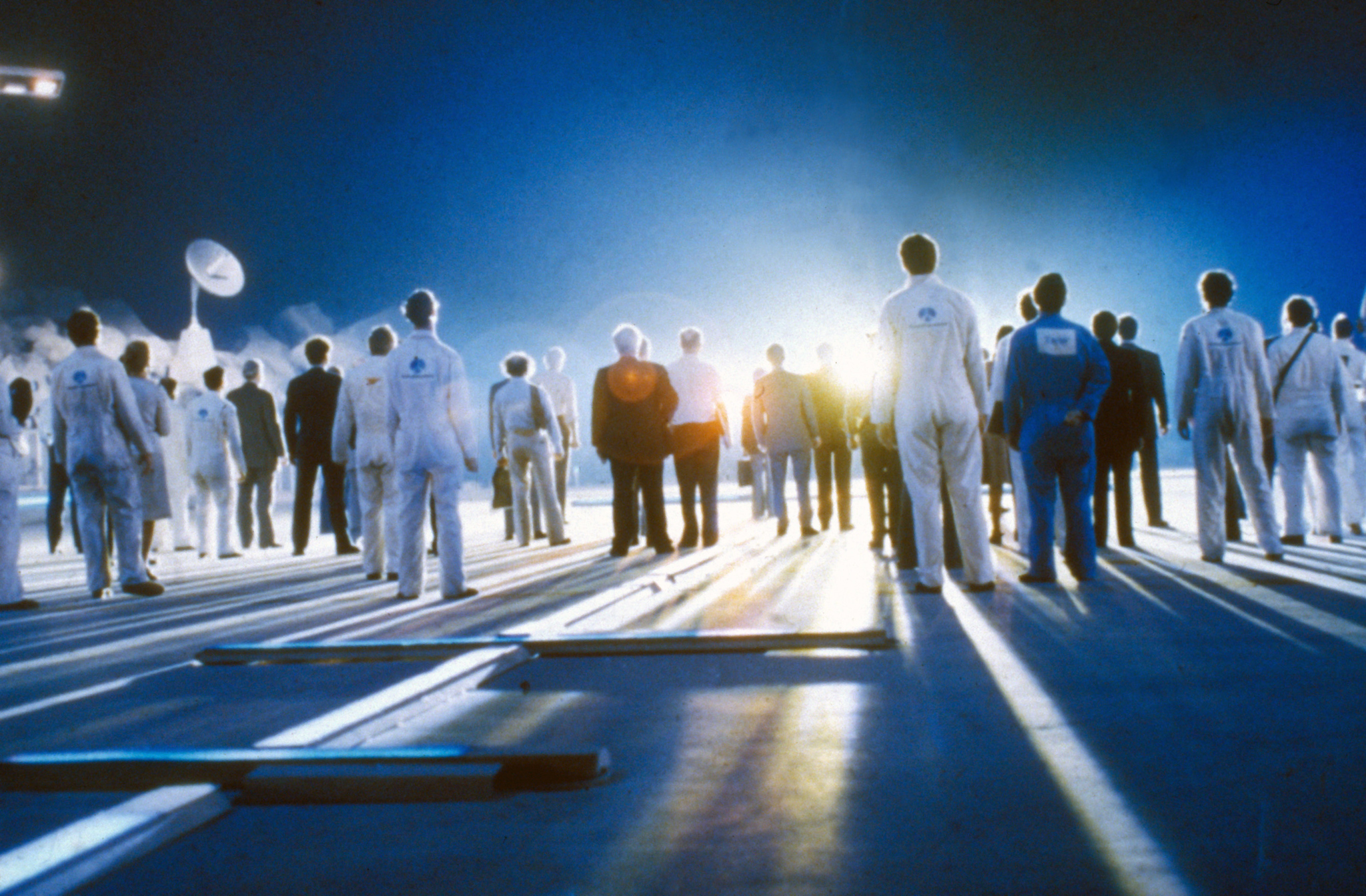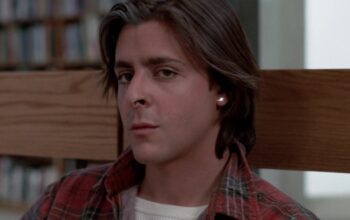Space. The far reaches of the universe. What lies beyond our galaxy? Is there anyone out there? Who sent out the alien signal in 1977? Mason Horsley is off to investigate the sudden disappearance of famed football legend Flash Gordon and crazed lunatic Hans Zarkov. Daniel Fagan has already left for America to interview Roy Neary, a proclaimed believer of extraterrestrials and who claims to have seen flying saucers first hand. It’s a weird universe out there, maybe among the stars, there are answers to these questions…
Flash Gordon (1980) dir. Mike Hodges
“That son of a bi***!”
“That was really selfish of him.”
“I know, and after I watched his piece of sh** movie 100 times!” -Ted 2
You’re on your way to work, your suit is cleanly presented, your tie is straight, nothing can go wrong. You walk through Times Square when the TV screen usually showing the new deals on at Starbucks flashes with the face of Ming The Merciless. “Your precious world leaders are dead, your armies rendered useless and your saviour, Flash Gordon is gone. Your planet is now under my control, another addition to the Mongo empire.” You shiver as you imagine what they’ll put you through, mining for limitless diamonds, made to be a concubine… your thoughts are interrupted as you hear a faint drum getting louder and louder, and then a striking guitar riff.
“FLASH!”
In the sky, you see your saviour, Flash Gordon: Quarterback, New York Jets.
‘Flash Gordon’ is one of those fever-dream science-fiction films from the 80s which sought to be the next ‘Star Wars’ Saga. It’s an interesting piece of history and watching it the second time brought a whole new lens to view the film through. In 1991, the Soviet Union collapsed, ending the Cold War, America was finally victorious against the Communists. ‘Flash Gordon’ was released in 1980, telling the tale of an American quarterback flung into space to battle villainous aliens with an aesthetic that could resemble Asian garments (that’s just my interpretation though). To me, this feels like a piece of patriotic Americana, a relic of the Cold War era.
In 1934, ‘Flash Gordon’ was created to rival the science-fiction hero ‘Buck Rogers’, but that didn’t stop Gordon from making waves through the character’s comic strips. However, due to World War Two, it was almost indefinitely doomed to never see the light of day again. ‘Flash Gordon’ was banned in Germany and almost completely taken off the shelves in Italy. Edgar P. Jacobs, a Belgian artist who had never written for ‘Flash’, ended the series and the character’s journey before the hero returned to newspapers throughout the world once the war had ended
It’s interesting to think of what could have been. Before George Lucas made ‘Star Wars’, he sought to buy the rights off of Dino De Laurentiis, but this was unsuccessful. American Football star Sam J. Jones succeeded over Schwarzenegger and Kurt Russell for the lead role and some of the greatest directors of all time were offered the film before we got the fun and hilarious interpretation left behind by Mike Hodges. Somehow, Sergio Leone doesn’t strike me as a space opera kind of guy.
When Ming The Merciless looks for a new planet to amuse himself with, he stumbles onto Earth and decides to hurl natural calamities onto our world. These disasters lead Flash Gordon to crash land his plane, with travel agent Dale Arden, into the laboratory of disgraced scientist Hans Zarkov. This film wastes no time, within the first 15 minutes, the three are all floating in space, being summoned by Ming in his palace. Ming has other plans of course, and Flash must unite the territories of Mongo in a revolt if he wants to head back to Earth alive.
Sam Jones is admittedly, more a footballer than an actor, but it doesn’t mean you don’t end up enjoying his antics of flirting with Dale, naively threatening Ming and assuming everything will go alright with him. He portrays Flash more as a cocky Luke Skywalker, but luckily he stands out just enough to do his own thing. Dale Arden is played by Melody Anderson, she’s no final girl, but she’s the perfect damsel in distress movies like this need. She’s smart enough to get by on her own but she can’t bear to be alone from Flash for 10 seconds. Quite a bit of the humour, I found, came from the pair’s accelerated relationship. Over the course of a few days, Flash and Dale go from strangers to fiancees. Max Von Sydow plays Ming, but unfortunately, he doesn’t get a lot of screentime, most films will compensate by having other characters whisper of their evil, but unfortunately ‘Flash’ doesn’t. The same can be said about Chaim Topol as Zarkov. Some interesting additions to the cast are a pre-Bond Timothy Dalton and a pre-Blackadder Brian Blessed as Prince Barin and Vultan respectively. You haven’t lived until you’ve heard Dalton declare the princess an “evil bi***!”. Dalton is just as devilishly charming as his portrayals in the Bond series and ‘Hot Fuzz’. Blessed is just as boisterous as ever, cackling as he hits guards over the head, screaming his war cries like a Viking, he’s the perfect portrayal of a barbarian hawkman.
Lastly, I’d like to discuss the knockout soundtrack composed by Queen. If I could pick three songs for you to listen from the soundtrack, it would have to be ‘Flash’s Theme’, ‘Football Fight’ and ‘Battle Theme’. Imagine ‘Dark Side Of The Moon’ mixed with any White Stripes album. Brian May goes crazy on the guitar with the Wedding March and Roger Taylor’s drum beat on ‘Flash’s Theme’ is anxious and thrilling. It’s truly an underappreciated soundtrack, even when you hear Mercury belting out Flash’s name and how he’ll save every one of us!
Mason’s Top 3 Reasons Why You Should Watch ‘Flash Gordon’
- Skyscapes that would make ‘The Neverending Story’ weep
- An amazing story you could examine through so many angles, was everyone on drugs or was everyone overwhelmingly patriotic?
- A kick-*** soundtrack to rock out to in your seat as Flash pummels the Emperor’s guards in football
Close Encounters of the Third Kind (1977) dir. Steven Spielberg
“If everything’s ready here on the Dark Side of the Moon… play the five tones.”
Steven Spielberg is likely the best-known director in the history of Hollywood. Not without good cause of course. Over his 50-year career (give or take a few years depending on where you start counting) he’s directed 34 movies, almost all of which are household names today. Jaws, Raiders of the Lost Ark, E.T., Empire of the Sun, The Last Crusade, Jurassic Park, Schindler’s List and Saving Private Ryan. Those are just some from before the turn of the millennium. He has irreversibly altered the landscape of the film industry with hit after hit after hit, there’s never been anyone else like Spielberg and I can’t say for sure there ever will be again. Of his 34 films, 29 were scored with compositions by maestro John Williams, who for many is in contention for not just the title of greatest film composer but is one of the greatest composers of all time. Williams elevates everything he touches to the level above the level anyone would expect. There is no better way to prove one’s skill than stripping back their work to the most basic components. Five tones were played on a piano. Three hundred arrangements before the pair found the perfect one: ray, me, doh, doh, soh.
Spielberg’s first significant foray into feature film was the 1971 thriller Duel, a low-budget production about a murderous truckdriver which has aged remarkably mostly due to Spielberg’s apparent natural talent for direction. Duel is a fantastically paced work with tremendous editing. He does wonders with what he has, but it’s clear the budget is holding the young director back. Spielberg’s next big success was 1975’s Jaws, which really needs no introduction, and when I say it was a big success I may be understating it. Made with an estimated budget of seven million dollars, Jaws was a worldwide phenomenon with a final grossing around four hundred and eighty million dollars at the box office. This moment is credited with inventing the ‘summer blockbuster’ as we know it today. With the smashing success of Jaws Spielberg was handed an almost blank cheque and the 29 year old set his sights on a phenomena he had been obsessed with since childhood, contact with extra-terrestrials.
Close Encounters of the Third Kind is, to me, the unsung masterpiece in the career of a man who can scarcely make anything but. Until the biographical The Fabelmans released in 2022, this was the most insight the general populace had to Spielberg. In hindsight, it’s the most personal of all his works. The ‘Spielbergian’ tropes which would carry on through his career really first appear here and include all the hits; a dysfunctional family, references to Pinocchio and The Greatest Show on Earth, a conflict between nature and machine (or the coming together of those). For Williams too Close Encounters is criminally underrated, on the surface it’s simple, but something profound simmers just below that simplicity.
The film has an absolutely phenomenal opening. Sand obscures the audience’s vision and the wind lashes out of the speakers. A jeep rolls into view, a title card: ‘The Sonora Desert, Mexico. Present Day.’ A group of men with giant plastic goggles heave themselves into the sandstorm and meet a member of the Mexican army. Shouting over the storm, one of the goggled men asks, “Are we the first?” It’s a great way to start a great scene. From Mexico the film cuts to suburban America and the audience meets the main protagonist, regular blue-collar worker, Roy Neary, who experiences a close encounter with something indescribable which shakes his perception of the world and compels him to act in ways he can’t explain. Roy is drawn the ‘Devil’s Tower’, a rock formation which has burrowed its way into his mind where he believes answers will be found. The first half of the movie is almost entirely dedicated to Roy’s spiral as his family, neighbours and the government become increasingly wary of his acts.
Running parallel to Roy’s story are two others, although less screentime is dedicated to them it doesn’t make them any less compelling. The first of these parallel stories is that of Jillian Guiler whose son, Barry, was drawn to the lights darting through the night sky and vanished. Like Roy, Jillian is plagued with images of the ‘Devil’s Tower’ and also makes the journey there. Not infected with those images, but desperate to be, is Claude Lacombe. Lacombe becomes the de facto leader of the government’s research project which may sound boring but he is one of the most compelling characters of the entire film.
When Spielberg made Jaws, the shark didn’t work. That is possibly the most famous piece of movie trivia to grace your ears (next to Viggo Mortenson really broke his toe when he kicked that helmet) but the commonality of that knowledge doesn’t change it’s truth. The shark didn’t work so he didn’t show it as often, it makes it scarier. A blessing in disguise. With Close Encounters Spielberg brings that same notion, don’t show the shark, or rather UFO, it makes it more magical (you’ll notice Williams heavily references “When you Wish Upon a Star” in the score.) When the mothership (designed by the singular Douglas Trumbull) is finally revealed at the end of the film it is, pure movie magic. In that moment you get a feeling no other artform can provide. The composition, the model, the music, the sound design all come together in a beautiful display of technology mixed with art.
If there was one Steven Spielberg movie that had to be shot into space for E.T. to watch, my vote would be for Close Encounters. Not because it’s about aliens, but because it demonstrates the grandeur, beauty and devastating empathy humanity is capable of when geniuses come together and form something remarkable.

Mason Horsley is a graduate of UOW with a Bachelor’s degree in Creative Arts, majoring in Creative Writing and minoring in Theatre. He hopes to write and direct a feature film and has been working on screenplays since he was 17. He writes film reviews for the Tertangala and works on his latest project ‘The Last Film’ while working a full-time job at a fish market. Mason despises reviewing films he dislikes and because of this, every review he writes acts as a recommendation.
Image Credit: IMDb




